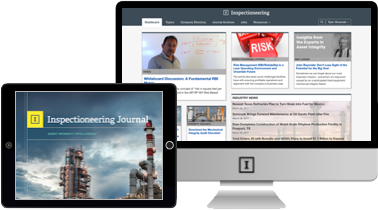As Chairman of the API Inspection Committee, one of the questions I often receive involves the differences between the API Pressure Vessel Inspection Code (API-510) and the National Board Inspection Code (NBIC).
There are a number of similarities between the API-510 code and the NBIC and there are a number of clear and valid differences between the two codes. Many of the similarities stem from the fact that sections of both the API-510 and the NBIC were patterned after the original 1932 API-ASME Code, leaving the ASME Code to cover only new construction issues. For many years afterwards, Section X of the NBIC was nearly identical to the new API-510 Code; however in 1977, Section X was deleted from the NBIC.
On the other hand, there are also numerous differences between the NBIC and API-510. To begin with, the NBIC covers boilers and public pressure vessels outside of the petrochemical industry, while the API-510 Code covers only owner-user pressure vessels within the petrochemical industry. For boiler inspection and repairs, the petrochemical industry also relies on the NBIC, which is the applicable code for boilers in the industry.
One of the most significant differences is that the API-510 Code is an engineering and inspection code. Its use is not only restricted to organizations that are authorized inspection agencies, but is also restricted to organizations with (or access to) engineering capabilities. Why the difference? Because it is vitally necessary that the authorized API pressure vessel engineering capability for decisions involving design issues. In several spots with the API-510 Code, the inspector is directed to "consult with", "get the approval of", "have a procedure developed by", or "obtain design calculations from" a pressure vessel engineer. Additionally, the NBIC does not recognize owner-user inspection as authorized inspection agencies, whereas the API-510 code does, and sets up specific requirements for them.
Another important difference between the two codes are the numerous additional "alternate" repair procedures outlined in the API-510 Code. These alternatives provide owner-users with reasonable, safe options to some specific construction techniques. These alternative procedures have a long, proven track record of allowing owner-users to make safe, temporary repairs to pressure equipment, until such time that's planned, permanent repairs or replacements can be made during scheduled outages.

















Comments and Discussion
Add a Comment
Please log in or register to participate in comments and discussions.